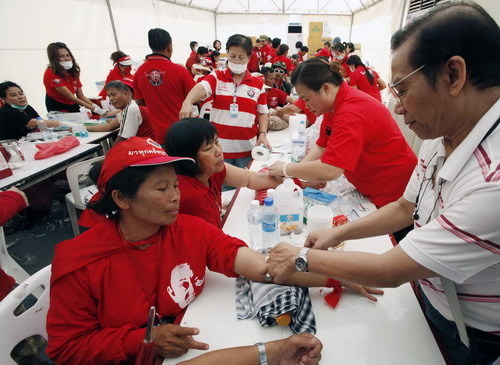Asia-Pacific
Thai protesters give blood to pour on streets
(Agencies)
Updated: 2010-03-16 13:47
 |
Large Medium Small |
BANGKOK: Anti-government protesters started donating their own blood Tuesday as part of a plan to splatter the Thai government headquarters in a symbolic sacrifice to press their demands for new elections.
Hundreds of red-shirted demonstrators formed long lines to have their blood drawn by nurses, a day after their leaders vowed to collect 1 million cubic centimeters of blood - the equivalent of 1,000 standard soft drink bottles - to spill at Government House by Tuesday evening.
As many as 100,000 so-called Red Shirt protesters converged Sunday on the Thai capital to demand that Prime Minister Abhisit Vejjajiva agree to dissolve parliament by midday Monday. Abhisit refused and blanketed the capital in security, but said his government was open to listening to what else the protesters have to say.
Frustrated, the protest leaders announced the "blood sacrifice," a tactic slammed by the Red Cross as wasteful - and unhygienic since diseases like hepatitis and HIV/AIDS can be spread if needles are reused.
Weng Tojirakarn, a protest leader and doctor, said the plan would test Abhisit's conscience.
"This blood belongs to fighters for democracy. What is its color? Red!" an announcer shouted as Weng and other leaders were having their blood drawn on a stage near a white tent where lines of blood donors formed.
Several orange-robed Buddhist monks, who are forbidden by law from taking part in political activities, were among the first in line with one proudly showing off a syringe filled with his blood.
The Red Shirts include supporters of former Prime Minister Thaksin Shinawatra and other activists who oppose the 2006 military coup that ousted him for alleged corruption and abuse of power. They believe Abhisit came to power illegitimately with the connivance of the military and other parts of the traditional ruling class who were alarmed by Thaksin's popularity.
Abhisit told a nationwide television audience that his government's goal is not to "remain entrenched" but that it would not step down in response to the protesters.
"The government must listen to the demonstrators. Although the demand can't be met by noon, we are willing to hear what they say," he said.
Charnvit Kasetsiri, a distinguished Thai historian, said that the government has not come out ahead in the episode.
"The fact that the prime minister has to resort to staying at the military base and nobody is aware of his whereabouts now indicates that the situation isn't looking good," he said. "The Red Shirts' plan to pour blood is both symbolic and dynamic. They won't back down that easily."
Two soldiers were wounded Monday by four grenades that exploded inside the compound of the 1st Infantry Regiment, known as the King's Own Bodyguard, army spokesman Col. Sansern Kaewkamnerd said. He did not blame Red Shirt demonstrators, who were not in the area, but said there has been intelligence that some elements had been planning such attacks.
However, the protests have to date been remarkably peaceful although embassies have issued warnings to their nationals of possible violence and US Assistant Secretary of State Kurt M. Campbell canceled a scheduled visit Tuesday.
The US Embassy said Campbell, on a swing through Asia, skipped the trip since he did not with to add to "logistical burdens facing our Thai friends at this time."
After withdrawing from the 11th Infantry base, protest organizers announced they were asking each demonstrator to donate between two and 20 teaspoons - 10 to 100 cubic centimeters - of blood. Their initial goal would be to collect 1,000 liters (264 gallons), which would require donations from between 10,000 and 100,000 people - roughly the protest crowd's peak size.
More blood would be spilled at the headquarters of the ruling Democrat Party and the prime minister's house if the protest demands were not met.
Dr. Ubonwon Charoonruangrit, a senior official of the Thai Red Cross Society, worried about the risks of untrained people drawing blood, as well as the effects on people who have been out protesting in the heat with little sleep.
She added that 1 million cc of blood "can save many lives."
Some 100,000 Red Shirt protesters have been camped out along a boulevard in the old part of Bangkok, though their number had visibly fallen Monday. A force of more than 50,000 soldiers, police and other security personnel has been mobilized in the capital.
For a second straight day, Thaksin spoke to the demonstrators by video, urging them to continue their struggle in a nonviolent fashion. He has cited the struggle against what he calls Thailand's ruling elite, and called Monday for lawmakers, soldiers, policemen, judges and members of the bureaucracy to join the Red Shirt cause.
Thaksin is a billionaire businessman who fled Thailand in 2008 ahead of a conviction on a conflict of interest charge for which he was sentenced to two years in jail.
Thailand has been in constant political turmoil since early 2006, when anti-Thaksin demonstrations began. In 2008, when Thaksin's political allies came back to power for a year, his opponents occupied the prime minister's office compound for three months and seized Bangkok's two airports for a week.












